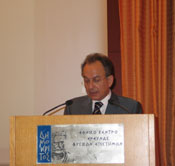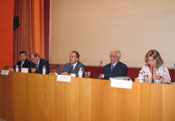18/11/2004
"The future of the European research policy" was the topic of the
information day organised in Athens, on 2 November 2004, by the General
Secretariat for Research and Technology. The main speaker, Dr Achilleas
Mitsos, Director General for Research at the European Commission,
presented the initiatives for the 7th Framework Programme, as well as a
short but comprehensive overview of FP6 specially focused on the
problems encountered during its implementation.
Other speakers were Prof. I. Tsoukalas, General Secretary for Research
and Technology, and Dr Christos Vasilakos, responsible for research at
the Greek Permanent Representation of the EU. The information day was
attended by the national representatives for the 6th Framework
Programme, and participants from research centres, universities, etc.
The Minister for Development, D. Sioufas, underlined that research and
innovation can significantly boost the Greek economy. He also repeated
the goal to increase the national spending for research to 1,5% of the
GDP by 2010.
Regarding the Greek participation in FP6, he noted that "The Greek
research teams have managed to get involved in wide scale research
activities and to claim efficiently EU funding. He also stressed that
"We support the need to restore the balance between new and old
instruments, in the sense that the funding for traditional instruments
should be increased in both the current and the forthcoming Framework
Programme. This increase will enhance the participation of the research
community, the industry and the SMEs".
 As far as the 7th Framework Programme is concerned, the Minister noted
that Greece supports the continuity of the Framework Prgramme and the
reinforcement of both cooperative research, which produces high added
value, and basic research. Moreover, Greece aims to create
infrastructure that will put the country in the lead of European
politics in SE Europe, the Balkans and near East.
As far as the 7th Framework Programme is concerned, the Minister noted
that Greece supports the continuity of the Framework Prgramme and the
reinforcement of both cooperative research, which produces high added
value, and basic research. Moreover, Greece aims to create
infrastructure that will put the country in the lead of European
politics in SE Europe, the Balkans and near East.
In his opening speech, Dr A. Mitsos made some general remarks on the
European research policy, stressing that the research budget is, for the
first time, at the centre of decisions on the future of the European
budget. However, the public domain in the EU countries should establish
the appropriate environment to maximize the participation of the private
sector in research.
Moreover, he noted that the research and innovation policies, although
connected, constitute two different issues. "Only the knowledge
constitutes a product of research. The way this knowledge is
disseminated and converted into a product is another issue. Generally,
the policy for the transfer and dissemination of knowledge includes
various domains, from education to innovation and industrial policy, and
there is still a lot to be done in these areas".
New thematic priorities and intervention means in the FP7
 Referring to the thematic priorities of FP7, Dr A. Mitsos stressed that
"It is the priorities that should be important. They have to constitute
a public good, in the sense that there should be a reason to place
public spending in the promotion of a particular area, as well as a
reason for the public spending to come from the Community budget. The
European intervention through FP7 is related to the European added
value, meaning the need for cooperation between the countries in the
framework of the external economies, as well as the link of the EU
research policy with the European policies in other areas".
Referring to the thematic priorities of FP7, Dr A. Mitsos stressed that
"It is the priorities that should be important. They have to constitute
a public good, in the sense that there should be a reason to place
public spending in the promotion of a particular area, as well as a
reason for the public spending to come from the Community budget. The
European intervention through FP7 is related to the European added
value, meaning the need for cooperation between the countries in the
framework of the external economies, as well as the link of the EU
research policy with the European policies in other areas".
The most important novelties in the Commission's proposal for the new
Framework Programme are: the establishment of the European Research
Council (a new institution that will fund basic research on a
competitive basis), the research platforms (an initiative to promote the
cooperation between companies, research centres, funding bodies and the
pubic sector for the identification of common research priorities in
specific areas) and the funding of new research infrastructures.
Dr A. Mitsos made particular reference to the "guides" that should
determine the research priorities: a) the European Council, the
Parliament and the Commission, that have no intention to radically
revise the priorities, b) the industry, that will contribute to the
initiative for the technology platforms, and c) the scientific
community, reflected in the views of the European Research Council.
In general, the current instruments (new and traditional) will be
maintained, with a trend of balance. There will also be some new types
of instruments, like the joint technological initiatives related to wide
scale projects.
Regarding the European Research Council, Dr A. Mitsos claimed that it
should operate autonomously, using scientific excellence as the unique
criterion for the evaluation and funding of projects. It should not,
however, replace the national funding.
Concerning the European research potential, he underlined that the Marie
Curie programme is particularly successful, and that a budget increase
will be requested. The link between national and the European
scholarship systems should also be strengthened, given that although the
researchers' mobility and career issues are at the centre of EU
discussions, they are mainly subject of national policies.
Another priority of the new Framework Programme is the funding of new
large research infrastructures, with the widest possible definition, the
6th Framework Programme having provided funding only for studies about
infrastructure, as well as for networking and accessibility issues.
Emphasis will be placed on the utilization of the existing research
capital, a problem affecting not only the new EU member states, but also
some of the old ones. A new programme is being prepared in order to
identify research institutes and areas that a country can develop. This
programme aims at countries and regions characterized as "Target 1" in
the European regional policy, and therefore a significant part of Greece
can profit from it. Another key objective is to attract researchers from
third countries.
Prof. I. Tsoukalas stated that the government intends to provide all the
necessary horizontal instruments for research management to allow, at
national level, the best possible coordination of all activities
realized by diverse ministries and bodies. Dr Ch. Vasilakos referred to
the conclusions of the last European Council on the future of research.
He also underlined the need for collectivity and coordinated actions for
the promotion of the Greek interests.
Facing the problems of the 6th Framework Programme
 Regarding the 6th Framework Programme, Dr A. Mitsos presented the main
problems that have aroused till today and have to be tackled in the
forthcoming Programme.
Regarding the 6th Framework Programme, Dr A. Mitsos presented the main
problems that have aroused till today and have to be tackled in the
forthcoming Programme.
The participation of SMEs in FP6 with a percentage of 15% is one of
them, since this specific goal has not been achieved yet. Moreover,
there has been an "over-submission" in certain areas, such as the Marie
Curie programme, in the sense that many high quality proposals had been
submitted but only few of them could be funded. To avoid time and effort
consuming proposal preparation, a two-step evaluation process will be
implemented in certain areas of the Programme. Another problem
encountered in FP6 is the limited utilization of certain possibilities
offered, such as the funding of cooperation with third countries, an
action that Greek bodies could exploit.
For the new instruments, Dr A. Mitsos stressed that they have been
introduced quite abruptly, with the emphasis placed on the size rather
than the target. "This has led to a need to support big projects.
However, nothing prohibits Networks of Excellence from having smaller
size than the Specific Targeted Research Projects. Another misconception
is that the Networks of Excellence concern big projects, big countries
and big organizations".
Dr A. Mitsos supported the creation of autonomous research councils in
all countries. He also mentioned that Greek researchers have an
excellent presence, at European level, in all actions of the Framework
Programme.
Finally, all speakers stressed the need for Greek researchers to
actively participate in the determination of various targets in the
calls for proposals in FP6, as well as in the thematic priorities of
FP7. With efficient and prompt interventions by the national
representatives, at European level, the Greek participation can be
significantly increased.

 News-Events
News-Events
 R&D News
R&D News

